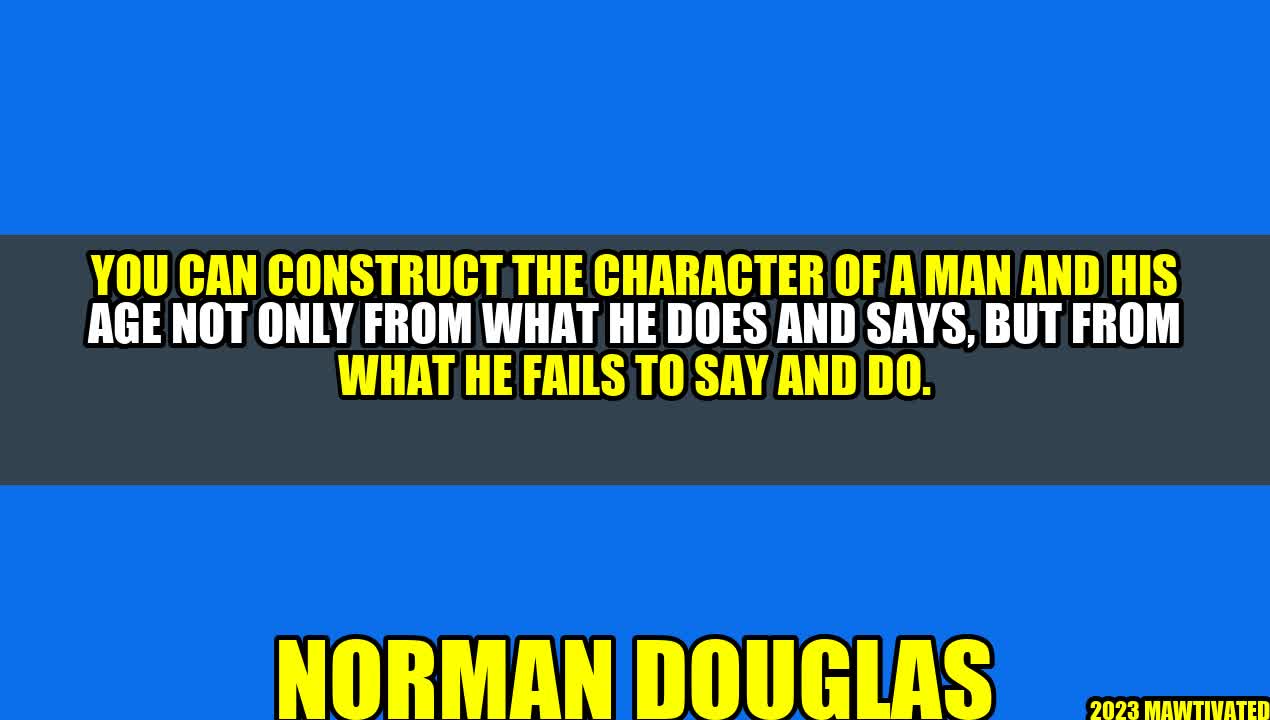The Character of a Man and His Age

An Inspiring Story
Once upon a time, there was a man named John who was known in his community as a kind-hearted person. He had a reputation for always lending a helping hand to those in need and never hesitated to stand up for what was right. One day, a young boy approached John and asked if he could teach him how to be as good a person as he was. John simply replied, “I can’t teach you how to be good, but I can show you how to do good.” From that day on, John took the boy under his wing and showed him how to make a positive impact on the world.
The Importance of What is Left Unsaid and Undone
As Norman Douglas once said, “You can construct the character of a man and his age not only from what he does and says, but from what he fails to say and do.” This statement reigns true in our everyday lives. We often judge people by their actions and words, but it’s equally important to pay attention to what is left unsaid and undone.
For example, if someone claims to be a trustworthy individual, but you notice that they frequently back out of promises or only follow through on their commitments when it’s convenient for them, it’s important to consider what they’re not doing or saying. This observation may indicate that their character might not match their words.
Furthermore, one’s age can also be shown by what they fail to say and do. If you observe an elderly person who always refrains from taking action or speaking up, it’s an indication that they may be afraid or lacking confidence, which can be a common trait in older individuals.
Examples of What is Left Unsaid and Undone
- A boss who always claims to value their employees’ contributions but never takes the time to listen to their ideas.
- A friend who talks about how much they care about you but is never available when you need them.
- An athlete who has all the potential to excel in their sport but never shows up to practice or puts in the necessary training.
- A politician who promises to represent their constituents but fails to deliver on their campaign pledges once in office.
When I was younger, I had a friend who always talked about how important education was to him. He constantly boasted about his grades and how he was going to go to a prestigious university. However, I noticed that he wasn’t putting in the effort needed to achieve these goals. He spent more time partying and playing video games than he did studying or preparing for tests. It was clear that his words didn’t match his actions and he wasn’t as committed to his education as he claimed to be.
Another example is a colleague I used to work with who always boasted about their work ethic and willingness to take on extra tasks. However, I noticed that when it came to actually completing those tasks, they often fell short or made excuses. It was clear that they were more interested in appearing productive than actually being productive.
Author Background – Norman Douglas
Norman Douglas was a British writer who lived from 1868 to 1952. He was known for his travel writing and fiction novels, as well as his controversial personal life. Douglas was a man of many talents, including being a linguist, art collector, and archeologist. His writings often reflected his experiences and observations from his travels around the world.
Conclusion
- Pay attention to what people say and do, but also what they don’t say and don’t do.
- If you notice someone’s behavior doesn’t match their words, it’s important to consider their character and intentions.
- Actions speak louder than words, but what is left unsaid and undone can also paint a picture of someone’s character and age.
Hashtags: #personaldevelopment #characteranalysis #actionspeakslouderthanwords #payattention #normandouglas
SEO Keywords: character analysis, personal development, age, actions speak louder than words, norman douglas

Curated by Team Akash.Mittal.Blog
Share on Twitter
Share on LinkedIn